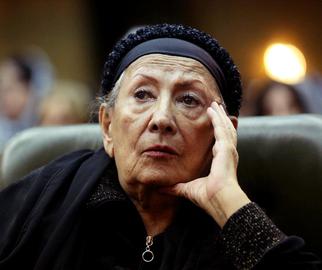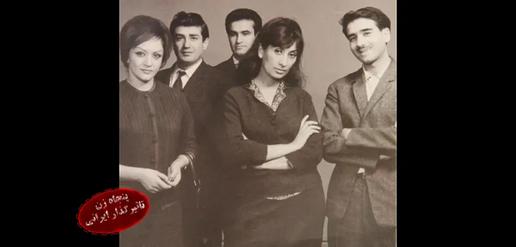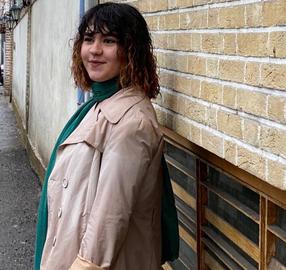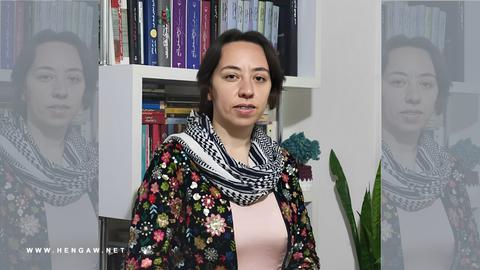Pari Saberi, a writer, theater director and actress, was born in 1932 to a cultured family in the southeastern Iranian city of Kerman. She was just 12 when, at the suggestion of her uncle and the encouragement of her mother, she was sent to Paris to continue her education.
Saberi's time in the French capital after World War II coincided with a cultural and artistic transition period for France when artists brought works to the stage to free people from the pain caused by the devastating conflict.
"I studied cinema and I was very attached to it,” she said later. “By making a short film for my graduation, I won first place because of my technique and cinematic vision. But many boys of my age did not like it. Don't you believe that patriarchal society exists only here [in Iran]. At the time, female directors were not much welcomed. What is more, I was an Iranian who had won the prize.”
The short film that won her the best student film prize in 1954 was about Omar Khayyam, the classical Persian poet. One of the people who saw this film was Tania Balachova, a French actress and director of Russian origin and one of the most influential actor training teachers in France. She was impressed by the film and invited Saberi to study at her school and she did so for three years, starting in 1955. Then she spent three years in Spain to study before returning to Iran.
In the 1960s, Saberi started teaching at Tehran University. During the very first semester of teaching, she started working with theater director, playwright and translator Hamid Samandarian and the Pasargad Theater Company.
This troupe, one of the most successful and influential theater companies at the time, remained active for around 10 years. It was also one of the most modern theater troupes, and Saberi and Samandarian had a good income from it.
One of the plays that Saberi staged during this period of her career was an adaptation of Luigi Pirandello’s Six Characters in Search of an Author, an absurdist play about the relationship among authors, their characters, and theater practitioners. Forough Farrokhzad, a friend of Saberi and an avant-garde female poet who was then at the height of her fame and popularity, played one of the characters. Saberi herself also went on stage.
Saberi and the Pasargad Theater Company relied on the university for their students’ theater activities and were in need of a place for their productions. Saberi, who had been appointed as Tehran University’s director of extracurricular activities, decided to find a hall for performing avant-garde plays. She received a permit to build a new hall from Dr. Jahanshah Saleh, the president of Tehran University, and converted an abandoned storehouse in the rear area of the university to a theater hall.
Saberi named the hall Molavi in honor of the classical Iranian poet Jalal al-Din Rumi (often referred to as Molavi). The hall opened with a production of The Visit of the Old Lady by Swiss dramatist Friedrich Durrenmatt, directed by Hamid Samandarian. In the following years, Molavi Hall played an important role in Iran’s students’ theater and many prominent Iranian directors and actors such as Ali Rafie, Dariush Farhang, Mehdi Hashemi and Susan Taslimi started their careers there.
After 10 years of work and staging plays such as The Cherry Orchard by Chekhov, Yerma and The House of Bernarda Alba by García Lorca, and The Lesson by Eugen Ionescu, Pasargad group and Saberi had to end their activities when the newly established Islamic Republic launched its so-called “Cultural Revolution” and closed institutes of higher education for three years, aiming to purge the academia of Western and non-Islamic influences.
Then Saberi, her husband, a medical doctor, and their two children left Iran. Unlike in the 1960s, she now focused on learning more about Persian literature. In 1981, she staged her play Whence Me, Whence Love in Los Angeles. The play was about the life of her late friend Forough Farrokhzad and was well received by Iranians who had recently emigrated to that city after the 1979 revolution.
Then she decided to return to Iran but, as the war with Iraq was raging, she was not warmly received and the performance of her first play after returning, which was based on the poetry of Sohrab Sepehri, another friend who had died in 1980, was a box office failure.
However, when she staged plays at Tehran’s Vahdat Hall based on Persian classical literature such as Bijan and Manijeh and Rostam and Sohrab by Ferdowsi, Seven Cities of Love by Attar of Nishapur and the Flying Shams, adopted from poetry by Rumi, she was much more successful. The latter play was seen by more than 20,000 people in Iran and thousands more outside the country. In 2003, after this play was staged in Konya, Türkiye, on the 800th anniversary of Rumi’s death, UNICEF honored Saberi with its Avicenna (Ibn Sina) prize. She was also honored by the Rumi Global Foundation for the same work.
In 2004, after her successful production of Antigone in Italy and Flying Shams in France, she was awarded the French Legion of Honor.
At the age of 80, Saberi staged The Bird of Rain, a musical play about the joys and sufferings depicted in Persian literature, a play with more than 80 young actors, some of whom had just entered the field of theater.
visit the accountability section
In this section of Iran Wire, you can contact the officials and launch your campaign for various problems

























comments